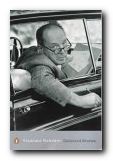a critical examination of Nabokov’s collected stories
‘A Russian Beauty’ (July 1934) which Nabokov himself describes as ‘an amusing miniature’ (RB,p.2) is not very much more than the use of the short story form as the frame for a character sketch – and it is an outline or a thumbnail sketch at that.
 Olga is an attractive young Russian woman over whom men go wild. After the revolution she moves with her family to Berlin and becomes a fashionable young thing, but following the death of her father she begins to decline both socially and physically. She also feels that she is too old at thirty to ever marry. When some friends introduce her to a wealthy businessman she accepts his proposal, but dies the following year in childbirth.
Olga is an attractive young Russian woman over whom men go wild. After the revolution she moves with her family to Berlin and becomes a fashionable young thing, but following the death of her father she begins to decline both socially and physically. She also feels that she is too old at thirty to ever marry. When some friends introduce her to a wealthy businessman she accepts his proposal, but dies the following year in childbirth.
In a superficial sense that is all there is to the story. The character is rendered largely in terms of her physical appearance and her gestures – something which Nabokov is particularly skillful at depicting:
‘she languidly danced the foxtrot to the sound of the gramophone, shifting the elongated calf of her leg not without grace and holding away from her the cigarette she had just finished smoking, and when her eyes located the ashtray that revolved with the music she would shove the butt into it, without missing a step’ (p.5)
But underneath the surface of the sketch we are offered a parallel which is being drawn, as in so many of his other stories of the twenties and thirties, between Russia and a woman. For Olga represents the old Tsarist Russia which many thought might survive the emigration to make a come-back, but which by the early thirties was obviously dead. Olga ‘was born in the year 1900, in wealthy, carefree family of nobles … Her childhood passed festively, securely, gaily, as was the custom in our country’ (p.3). This upbringing also incidentally parallels Nabokov’s own, and of course he often puts himself forward as a representative of the ancien regime.
Olga has a portrait of the Tsar pinned to her door – that is, she keeps alive the old traditions and beliefs, and it is only when her father dies (he too is a representative of Tsarist Russia) that she begins to go into decline. And even though she appears to have located her saviour, a husband, it is too late: she cannot survive beyond the early 1930s.
The parallel is not heavily underscored. She is given the hint of an illness at the outset to make the early death plausible – but there are so many other instances of women and Russia being offered alongside each other in some way (one thinks of Mary, his first novel) that the reading seems justified.
© Roy Johnson 2005
![]() Vladimir Nabokov: The Collected Stories – Amazon UK
Vladimir Nabokov: The Collected Stories – Amazon UK
![]() Vladimir Nabokov: The Collected Stories – Amazon US
Vladimir Nabokov: The Collected Stories – Amazon US
Vladimir Nabokov web links
Vladimir Nabokov greatest works
Vladimir Nabokov criticism
Vladimir Nabokov life and works